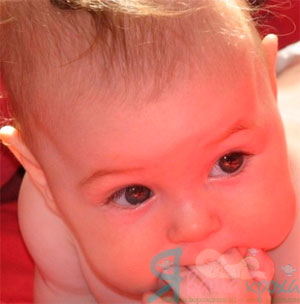 Rickets in a child: warned - means armed!
Rickets in a child: warned - means armed!
What is rickets?
Children's health is the focus of parental attention. In order for a growing organism to form correctly, it needs a whole complex of vitamins and minerals. Most of the child receives them by breastfeeding or feeding with an adapted mixture. But the need for vitamin D is not always replenished if these rules are followed, therefore, what rickets is, many mothers know firsthand.
Causes of rickets in children
According to various sources, the symptoms of this ailment are observed in about 40 percent of children up to a year. In countries where there is a shortage of sunlight, this figure is higher.
Most often, rickets in children up to a year arise because, while still pregnant, a woman did not pay due attention to her lifestyle and health. For example, if the expectant mother was difficult to endure the last months of pregnancy, she had late toxicosis, or she was too fond of diets, limited the consumption of foods containing animal proteins.
In the postnatal period, premature babies, babies born in the cold season, “artificial” babies and babies living in adverse conditions are at risk of rickets. Rickets in infants can provoke an unhealthy diet of a mother: if, being afraid to gain excess weight, she eats too little, prefers low-calorie foods, limits the consumption of milk, meat and fish.
In addition, there are the following causes of rickets:
- inadequate stay of the child in the fresh air in general and the sun in particular;
- tight swaddling and limited motor activity of the child;
- lack of breastfeeding, early transition to mixed or artificial feeding (especially mothers who use unadapted infant formula are especially at risk);
- gastrointestinal tract disorders, congenital pathologies (celiac disease, lactase deficiency, dysbiosis);
- tendency to frequent diseases;
- taking anticonvulsants;
- rapid increase in weight in a child (while the need for calcium increases).
How to identify rickets in infants - SYMPTOMS
The disease manifests itself gradually.
The first symptoms of rickets can be detected at 4-8 weeks of the baby's life:
- the child eats badly: his appetite decreases, his usual serving is not fed, and the feeding process itself takes less time than usual;
- baby becomes restless: trembles for no reason, often tosses and turns during sleep, becomes more moody and shy;
- sleep disorders: the baby falls asleep badly, often wakes up for no reason, shudders or cries loudly in a dream, the sleep itself is short and superficial;
- sweating increases: even in cool weather, the child becomes wet, wakes up in wet clothes, sweat has a specific sour smell and taste, diaper rash and prickly heat appear again after cure;
- hairs fall on the back of the head.Details about this;
- stool disorders are noted: Despite the usual diet, diarrhea, constipation may appear.
If you ignore this, after a few weeks, the following signs of rickets develop in infants:
- The muscles are in a low tone;
- The kid does not hold his head well, is in no hurry to turn over on his stomach, crawl, walk;
- Teeth erupt later;
- The fontanel closes later;
- The shape of the skull may change: the head becomes an elongated nape - flat, frontal tubercles appear;
- Bloating;
- The chest is deformed, the pelvis becomes narrow, the legs are bent.
Severe forms of rickets impose on the physical condition, and on the psyche of the child: a noticeable lag in development. Gross deformations of the chest, skull bones, and limbs occur.
In some especially neglected cases, children cannot sit and get up on their own. From the side of the cardiovascular system there is difficulty breathing, tachycardia. The liver grows in size.
It is possible to cure rickets - TREATMENT
Any disease is easier to cure if you start to do it at an early stage, so if you suspect rickets, you should consult a pediatrician. It is he who will establish the final diagnosis and tell you how to treat rickets.
Even if this disease has gone into a severe stage, doctors rarely resort to hospitalization. Usually, they prescribe a procedure that can be carried out at home, designed to eliminate the lack of vitamin D and to correct violations that have occurred in the body.
Treatment of rickets is based on a set of procedures to correct the regimen of the day, physical activity (walking) and the diet of mother and child.
It is necessary to make walks in the fresh air more often with the baby. If the weather is good, you can take air baths, harden. Sun baths MOST effective, but in hot weather it is necessary to avoid overheating (hardening in the sun).
The diet of the child should contain a sufficient amount of protein and minerals (calcium and phosphorus are especially important), vitamins.
Massage
Physiotherapy exercises and massage positively affect the state of health. Such a complex should include breathing exercises, stroking the legs, arms, feet, abdomen, chest and back. To strengthen the muscles of the baby, you need to turn from the back to the tummy, fix the reflexes of walking and crawling (supporting the child, giving him the right position). Swinging on the fitball or on your hands will help calm the child’s nervous system.
Video
In order to overcome tearfulness, lethargy, irritability, and normalize the child’s mental state, one should protect him from excessive impressions and external irritants (noise, bright light).
Bathing
With increased excitability of the baby, baths with the addition of needles extract can have a good therapeutic effect (1 teaspoon per 10 liters of room temperature water). They are shown to excitable kids. If the baby’s muscle tone is reduced, he is lethargic, and baths containing sea salt can help. To prepare the solution, you need to add 2 tablespoons of salt to 10 liters of warm water. 10-12 procedures are enough to provide a positive effect.
Medications for Rickets - VITAMINS
All medications should only be prescribed by a doctor!
Medication
- Aquadetrim - an aqueous solution of vitamin D3 (colecalciferol)
- Devisol, Wigantol, Videin - Oily solutions of vitamin D3
Among the drugs that are taken for rickets, the most effective solution is vitamin D.
But here there are nuances: vitamin D3 is more effective than vitamin D2, and an aqueous solution is longer in effect and is absorbed by the body better than alcohol or oil.
In any case, the vitamins for rickets should be prescribed by a pediatrician, he will select the type of drug, its dosage, determine the timing of treatment.
Often, the therapeutic dose of vitamin D (it is 2000-5000 ME) should be taken 30–45 days, and in the future, a maintenance (prophylactic) dose should be taken daily - from 400 to 500 ME. One drop of an oily solution of vitamin D3 contains approximately 420 IU of chicalcalciferol.
Vitamin D intake should be accompanied by constant monitoring of urinalysis, in order to avoid overdose, because large doses of it can have a toxic effect on the body. An overdose of this drug can provoke a decrease in appetite, nausea, vomiting, urinary retention, constipation, and even cramping of the limbs.
If anemia occurs against the background of rickets, it is treated with iron preparations in the form of syrup or drops.
Observing all the requirements, you can very quickly improve the condition of the child.
Preventing rickets is easier than curing - PREVENTION
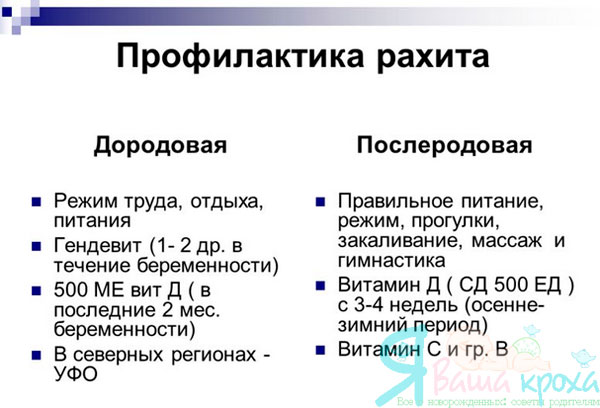
The health of the baby must be taken care of long before birth - during planning, as well as during pregnancy. At about 28 weeks of fetal development, the child's body begins to actively store vitamins. Vitamin D accumulates in the liver, adipose and muscle tissue of the fetus. During this period, a pregnant woman should carefully monitor her lifestyle:
- regularly visit a doctor at the antenatal clinic;
- eat regularly and fully;
- more often to be in the fresh air;
- protect yourself from colds and infectious diseases;
- walk a lot.
Sometimes a doctor may recommend taking vitamin D in preventive doses or prescribe multivitamins for pregnant women.
Prevention of rickets is carried out from the birth of a child and is especially needed for premature babies, with insufficient mass, in the first months of life, as well as those born in the autumn-winter and even spring periods. It is enough to observe the regimen, take long walks in the fresh air, get a lot of sun, temper and physically develop the child.
Prevention of rickets video:
 Breast-feeding - The best protection against many diseases, but only if your menu contains the necessary amount of nutrients. A nursing mother needs to streamline her diet: consume more dairy and sour-milk products, take multivitamins (mom's breastfeeding diet) If your baby is “artificial”, you need to choose an adapted milk mixture that would resemble the composition of human milk. (A very detailed article on breastfeeding)
Breast-feeding - The best protection against many diseases, but only if your menu contains the necessary amount of nutrients. A nursing mother needs to streamline her diet: consume more dairy and sour-milk products, take multivitamins (mom's breastfeeding diet) If your baby is “artificial”, you need to choose an adapted milk mixture that would resemble the composition of human milk. (A very detailed article on breastfeeding)
In the future, introducing complementary foods, it should be borne in mind that vitamin D is found exclusively in products of animal origin (meat, liver, butter, egg yolk) and systematically offer them to the baby. You should not abuse semolina. In addition to causing allergic reactions, it also inhibits the absorption of calcium in the small intestine.
Fish fat
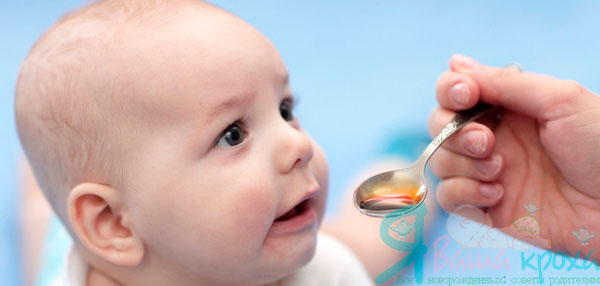
Children from the “risk group” are recommended to carry out drug prophylaxis of rickets. One of the most popular remedies is fortified fish oil. It can be given to children starting at four weeks of age, gradually increasing the dose.
It should be remembered that prevention is carried out under the supervision of a local pediatrician.
For the purpose of prevention, medications (vitamin D, fish oil) should be given for a certain period.
Rickets should not be allowed to drift - CONSEQUENCES
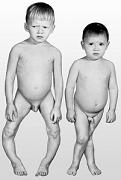
Most often, rickets does not pose a threat to the life of the child. But if you do nothing, the symptoms go away and the effects of rickets remain. Often children who have had this disease suffer from decay of deciduous and permanent teeth. Curvature of the legs. There may be a developmental delay.
Due to changes in the skeleton, scoliosis, flat feet, and pelvic deformity can occur. In schoolchildren, echoes of rickets are manifested in the form of myopia, anemia, decreased immunity and soreness (frequent bronchitis and pneumonia).
Mature people can develop osteoporosis.




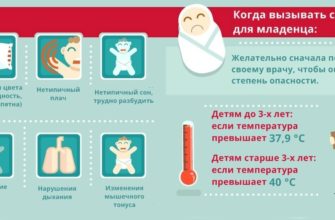




Hello! my child has rickets. due to rickets, a baby of 9 months old has developed a chest deformity. please tell me, after treatment, the chest will recover without surgery? it is very important for me…..
To prevent rickets, pediatricians strongly recommend that mothers give vitamin D to their children. We were prescribed aquadetrim a month, but I began to give only after I had tested and determined what dose to give the child. According to our analyzes, a prophylactic dose was prescribed, i.e. drop by drop per day. There were no rickets. We are now 1.5 years old, but still give it to my daughter and even in the summer. There is little sun, little vitamin D for children
The article says about fish oil. The daily dose of vitamin D is 500 IU, in 100 grams of fish oil -400 IU, in a drop of aquadetrim 500 IU. we will understand.
The doctor told us to give the aquadetrim to the baby, and said that an aqueous solution is better than an oil solution. Little son drinks without objection, also smacking. Probably, up to 3 years we will give, well, this is how the doctor will say. Useful droplets.
Symptoms are all out of date !!! And normal doctors because of bald patches, sweating pens, legs and head will not put rickets !!! Also, sleep disturbance and a capricious child, on the contrary, becomes due to an overabundance of vitamin D. I will say for myself if, according to such symptoms, the doctor says that your child has rickets, change the doctor !!!! A normal doctor will first prescribe an X-ray and a blood test for vitamin D, phosphorus and calcium !!!
Mary, I support you. Rickets is put on the analysis, after examination, and not because of sweating and bald spots.
From my own experience I’ll say that for a long time I didn’t want to give my son extra vitamin, but still I did an analysis of the baby for vitamin D. It turned out to be much lower. Now I give aquadetrim and understand what and why I give. It turned out that walking is good, but you won’t get much vitamin D from these walks. Need extra.